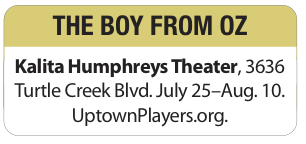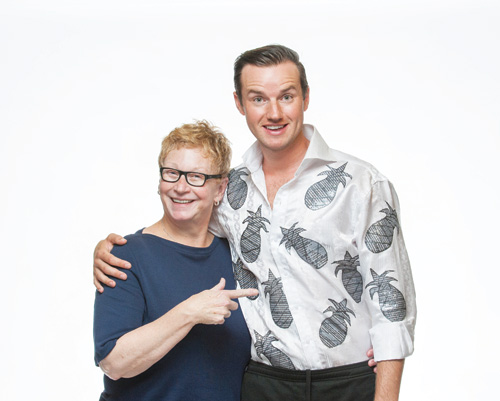Alex Ross reunites with director Cheryl Denson for Uptown Players’ regional premiere of the flamboyant musical biography ‘The Boy from Oz’
ARNOLD WAYNE JONES | Executive Editor
 When North Texas theater companies want to mount splashy, entertaining musicals, they all know what the secret weapon is to making them great … and it’s not much of a secret: Hire Cheryl Denson.
When North Texas theater companies want to mount splashy, entertaining musicals, they all know what the secret weapon is to making them great … and it’s not much of a secret: Hire Cheryl Denson.
For years, she’s been the favorite go-to director for everyone from Lyric Stage (where she usually stages huge revivals of Golden Age Broadway classics) to Uptown Players.
You can even catch her tackling a play once in a while.
But for the last year or so, you haven’t seen her work represented. The reason was simple: She needed a break.
Luckily for audiences, that hiatus ends this week when she returns to Uptown for The Boy from Oz. And it’s a reunion of sorts, as Denson teams again with leading man Alex Ross — who has himself been absent from local stages for a year.
It’s an ideal pairing of behind-the-footlights talent and in-front for a show that draws its primary appeal from a charismatic lead and a dazzling staging. And charting this territory is new for Denson and Ross.
“This isn’t like with a Rodgers & Hammerstein musical, where you’re looking for a new way to do a very old thing,” Denson explains. “The history of [The Boy from Oz] is tied to only one actor. So you need to find the show, not the personality in it. You need to fall in love with a show, or not do it. But if you look hard enough, you can fall in love.”
That “one actor” is Hugh Jackman, whose life-long ambition was to tell the tale of Australian-born entertainer and songwriter Peter Allen, a man as famous for marrying Liza Minnelli (and being flamboyantly gay) as he is for winning an Oscar co-writing “Arthur’s Theme.” (His sole contribution to that song? The line When you get caught between the moon and New York City — but rarely has such a small investment paid such dividends.)
Jackman won a Tony Award for his performance, and as soon as he left the production, it closed. It has not toured. So for Ross, stepping into such tap shoes was a little daunting … especially since he has no idea who Peter Allen was.
“I was very unfamiliar with him before the show,” Ross says diplomatically. “I knew some of his songs because they were [on the radio], but it wasn’t until I got cast I realized he wrote them. And when I learned Cheryl was directing and Jeremy Dumont was doing the choreography, I listened to the cast album and I understood what was involved.

PINEAPPLES … AND A PAIR Cheryl Denson and Alex Ross both took time off from stage work for the last year, but they return full-force with a musical based on the life of sassy entertainer Peter Allen. (Photo courtesy Mike Morgan)
And I wanted to be a part of it.”
What was involved has become perhaps Ross’ most daunting stage work to date. (He’s spent most of the last year working in film and television.) Ross sings, by his and Denson’s estimate, about 16 numbers and is onstage nearly the entire show. (“We even dress him onstage,” Denson says.) And there’s dancing to boot. (Compare that to Ross’ role as “Ziegfeld Tenor” in Lyric Stage’s Funny Girl: He walks out, sings one number in Act 1, then waits backstage for the curtain call two hours later.)
“How great is this opportunity,” Ross asks rhetorically. “This has to be one of the biggest musical theater roles out there for a man.”
“I’m always looking for a real actor [in my musicals],” Denson says, and this part demands more than most. “You have to be able to sing, dance, have charisma, charm and even play the piano a little. Alex does all that.”
Many of Allen’s songs were first popularized by other singers, from Christopher Cross to Olivia Newton-John. It wasn’t until he made his name as a composer that Allen was able to stake his own claim as a performer.
The script is structured as an elaborate flashback, told by Allen himself as he gives his last concert in his native Australia. At this point, Allen knew he was dying of AIDS, and was reflecting on his life from childhood to the present. And while the score is comprised of songs written by Allen, his memories shape the narrative, so they aren’t used chronologically, but to reflect what was going on with him emotionally.
Denson was especially interested in giving due to the volatile period of the 1980s and early ’90s, when the AIDS epidemic was devastating the theater community; Allen was, of course, among its casualties. His lover, in fact, was one of the first to contract the disease.
“I didn’t specifically do research on AIDS, so it hit me all of a sudden that most of [the actors in the cast] didn’t know about AIDS — all they knew were the myths,” Denson says.
“They didn’t know what a grassroots kind of thing [AIDS activism and awareness] was.”
There was some investigation that Denson did actively explore, however: The subject of the musical himself. But that did not extend to his songwriting output.
“I did a great deal of research about Peter Allen and what was going on in his life, but I did not research the songs — who they were written about, or for,” says Denson. “I chose to use the songs as they were meant to be: As ways of moving the plot along. That’s what’s kind of wonderful about musicals: We sing when the emotions are so great we can’t talk anymore. And when we can’t speak at all, we dance.”
And Peter Allen, perhaps more than most people, let his emotions explode.
This article appeared in the Dallas Voice print edition July 25, 2014.


